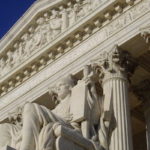
Published July 3, 2023
It’s been amazing to witness the flurry of foolish arguments that opponents of the simple and straightforward ruling in 303 Creative v. Elenis have spewed over the past several days.
- Let’s start with some background.
On September 20, 2016, 303 Creative LLC, a company specializing in graphic and web design, and Lorie Smith, its owner, filed a “complaint for declaratory and injunctive relief” against various Colorado officials, including members of the state Civil Rights Commission. (For sake of simplicity, I’ll use “Smith” to refer to both 303 Creative and Smith.)
Smith explained in her complaint that she wanted to design “custom wedding websites for weddings between one man and one woman” and that she also wanted “to explain her religious beliefs about marriage on her website and in communications with prospective clients, including why those beliefs prevent her from designing websites celebrating and promoting same-sex weddings.” But, she objected, Colorado’s Anti-Discrimination Act (CADA), as interpreted and applied by the defendants, prohibited her from doing so and violated her First Amendment rights.
On that same day, Smith filed a motion for a preliminary injunction. In that motion, Smith explained that if she went ahead with her plans without the benefit of a judicial declaration of her First Amendment right to do so, she would “incur investigations, re-education training, mandatory reporting, and fines of up to $500 for each violation of CADA.”
In the course of its bonkers ruling against Smith on the merits, the Tenth Circuit dedicated ten pages (pp. 11-21 of its opinion) to its threshold holdings that Smith had standing to pursue her claim for declaratory relief and that the case was “ripe” for decision. Among its determinations:
[W]e conclude that Appellants have shown an injury in fact. Appellants have sufficiently demonstrated both an intent to provide graphic and web design services to the public in a manner that exposes them to CADA liability, and a credible threat that Colorado will prosecute them under that statute….
Appellants have a credible fear of prosecution because Appellants’ liability under CADA and Colorado’s enforcement of CADA are both “sufficiently imminent.” Appellants’ potential liability is inherent in the manner they intend to operate—excluding customers who celebrate same-sex marriages. Thus, Appellants are rightfully wary of offering wedding-related services and may challenge CADA as chilling their speech….
Assuming Appellants offer wedding-related services to the public as they say they will, there is no reason to then conclude that Appellants will fail to attract customers. Nor is there reason to conclude that only customers celebrating opposite-sex marriages will request Appellants’ services. In short, we find nothing “imaginary or speculative” about Appellants’ apprehensions that they may violate CADA if they offer wedding-based services in the manner that they intend.
If Appellants violate CADA, it is also “sufficiently imminent” that Colorado will enforce that statute against Appellants…. First, Colorado has a history of past enforcement against nearly identical conduct—i.e., Masterpiece Cakeshop…. Second, any (would be) customer who requests a website for a same-sex wedding and is refused may file a complaint and initiate a potentially burdensome administrative hearing against Appellants. Thus, Appellants must fear not only charges brought by Colorado, but charges brought by any person who might request a website celebrating same-sex marriage. And third, Colorado declines to disavow future enforcement against Appellants….
Appellants’ injury is not merely the risk of complaints filed by private customers—it also includes the burden of administrative proceedings before the Director and the prospect of litigation brought by the Attorney General.
For the same reasons Appellants have established standing, we are satisfied that this case is ripe…. Article III does not require a pre-enforcement plaintiff to risk arrest or actual prosecution before bringing claim in federal court.
In his majority opinion for the Court, Justice Gorsuch recited with approval the Tenth Circuit’s holding that Smith had standing to sue, and he noted that “no party challenges [the] conclusions” on which the Tenth Circuit’s holding rested. Standing, of course, is an essential element of jurisdiction that a party cannot waive, so if Gorsuch believed that there was any question on standing that needed to be addressed, he would have addressed it.
In her dissent, Justice Sotomayor does not dispute that Smith had standing. (The only time the word “standing” appears in her opinion is in a footnote description of a case “accepting that a white man would be permitted to ride standing in the ladies’ car.”)
- Okay, let’s now turn to the confusion.
Last Thursday, the day before the Court issued its ruling in 303 Creative, the New Republic published an article that reported that “court filings” in the case included “a supposed request for a gay wedding website” that “was submitted to Smith’s website on September 21[, 2016].” The request included a man’s “name, phone number, email address, and website.” But, the article reported, the man named says that “he never sent this form … and at the time it was sent, he was married to a woman.” Even as the reporter seemed not to be entirely convinced by the man’s denial—“there’s a chance that he’s not telling me the whole story; that this is some elaborate prank he pulled years ago and doesn’t want to confess to now”—she asserted that “it looks like Smith and her attorneys have, perhaps unwittingly, invented a gay couple in need of a wedding website.”
In the ensuing days, this article has spawned lots of copycat articles and a zillion assertions that Smith “lied” about something supposedly central to her complaint.
There is so much wrong here that I hardly know where to begin. The two big points are that there is zero reason to think that Smith or her attorneys concocted the evidently sham request and that the Tenth Circuit’s standing holding did not rest in any way on the request.
a. Although her language might be artfully confusing, the New Republic reporter does not appear to actually be contending that Smith and her attorneys concocted the request. How would it be possible to do so “unwittingly”? What she evidently means is that their use of a request that they might or might not have discovered to be sham had the effect of inserting into the case an “invented … gay couple.”
There is zero reason to think that Smith or her attorneys concocted the request. The request was submitted midday on September 21, 2016—in the immediate aftermath of media coverage of the previous day’s filing of the complaint. That media coverage, which the New Republic reporter didn’t take note of, created a broad universe of individuals who would have an incentive to harass Smith with a phony request or to elicit a refusal from her, which could then be subject of a complaint to the commission. By contrast, if Smith and/or her attorneys somehow thought it useful to their case to create a phony request, they would have had a strong incentive to do so before filing the complaint and the motion for a preliminary injunction.
How would Smith or her attorneys have had the detailed personal information (email address, phone number, website) about the individual named in the request? (The individual’s website did not set forth that email address and phone number.) Why would they have submitted a request in the name of a longtime supporter of same-sex marriage, when any investigation by the commission into the request would promptly have revealed it to be a sham?
Smith signed a verified declaration stating that she had received the request, so she would be subject to perjury charges if she were lying. Her attorneys would risk debarment if they had concocted the request.
There also is no reason to believe that Smith or her attorneys discovered that the request was a sham. As Kristen Waggoner, the lawyer who argued and won the case in the Supreme Court, has explained on Twitter:
Lorie [Smith] received a request from a third party through her website. It’s true and undisputed. Whether it was a troll or genuine, she doesn’t know because had she followed-up and declined, Colorado threatened she’d be breaking the law. Colorado prosecuted Jack Phillips a second time when he followed up on a trolling request after winning at SCOTUS.
b. As the excerpts in the background above show, the sham request played no role at all in the Tenth Circuit’s holding that Smith had standing. Nothing would have changed in its, or in the Supreme Court’s, analysis if the New Republic had made its grand discovery years ago.
(Yes, the request is in the “court filings” in the case: It is included (on page 30) in the 358-page Joint Appendix that the parties filed as one of the exhibits that accompanied Smith’s motion for summary judgment in the district court more than six years ago, and one sentence in the facts section of Smith’s opening brief refers to it.)
Mr. Whelan holds the Antonin Scalia Chair in Constitutional Studies at the ETHICS AND PUBLIC POLICY CENTER. A regular contributor to National Review’s blog BENCH MEMOS, he has closely covered every Supreme Court confirmation since 2005. @edwhelaneppc
Picture from Unsplash
Edward Whelan is a Distinguished Senior Fellow of the Ethics and Public Policy Center and holds EPPC’s Antonin Scalia Chair in Constitutional Studies. He is the longest-serving President in EPPC’s history, having held that position from March 2004 through January 2021.











